What Is 0x?
Put essentially, 0x is a decentralized trade that enables clients to exchange diverse kinds of Ethereum-based tokens specifically. Decentralized trades are getting a great deal of consideration nowadays, for the most part since they keep away from a solitary purpose of disappointment.
Interestingly, unified trades, as Coinbase, Kraken, and ShapeShift, convey the danger of burglary since they expect clients to put their cash in the hands of an outsider.
Two of the most outstanding for all intents and purposes cash heists happened at Mt Gox in 2014 and Bitfinex in 2016, bringing about misfortunes of $460 million and $72 million, individually. ShapeShift was likewise the casualty of a series of burglaries in 2016, bringing about $230,000 in misfortunes.
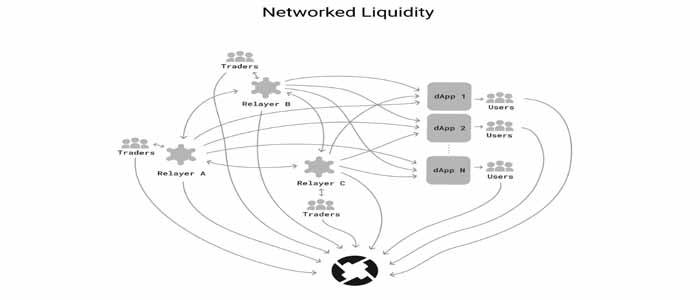
Along these lines, the entire thought of a decentralized trade is to guarantee exchanges occur on the blockchain, where reserves are more secure.
To clarify further, 0x works something like this: A "creator" communicates his or her request. A "relayer" at that point posts that request in an off-chain arrange book and a counterparty (called a "taker") acknowledges the request by pushing the exchange into the task's DEX brilliant contract.
0x is an open convention that is intended to offer a decentralized trade as a major aspect of the Ethereum blockchain. 0x is made utilizing a convention that includes Ethereum shrewd contacts that permit those around the globe to run a decentralized trade.
The group behind 0x unequivocally trusts that later on, you will discover a great many tokens from Ethereum and that 0x can give a proficient and dependable approach to trade them. 0x is intended to be not the same as both concentrated and decentralized trades, giving the most ideal mix of highlights.
The prime supporters of 0x are Will Warren and Amir Bandeali, the first is the CEO and the second is the CTO. Both are in brilliant contract innovative work. Warren used to lead connected material science explore at the Los Alamos National Laboratory subsequent to concentrate mechanical designing at UC San Diego. Bandeali used to be a settled salary dealer with DRW after he considered fund at the University of Illinois, Urbana-Champaign.
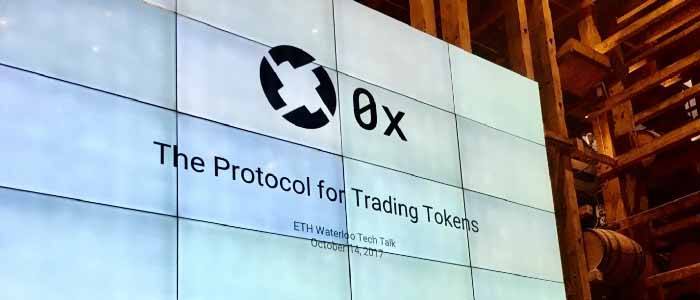
Among the other colleagues, you will discover blockchain engineers, programming specialists, realistic and item creators, end-to-end business strategists, and individuals with different abilities. The counsels for the task established or work at organizations, for example, Polychain Capital, Coinbase, and Pantera Capital.
The 0x project is being funded by Fintech Blockchain Group, Pantera, Polychain Capital, Jen Advisors, and Blockchain Capital, showing a diverse range of interests.
When Warren and Bandeali co-founded the 0x Project in October of 2016, they did so in hopes of a world that allows for every asset’s representation as part of the Ethereum blockchain. Ideally, the included assets would have everything from digital game items to stocks to gold and fiat currencies. With so much tokenization, there will be thousands of different types of tokens, requiring a trustless exchange for users.
While the co-founders appreciate the developments of decentralized exchanges, they saw an opportunity for improvement. With 0x, they hope to address the inefficiencies of decentralized cryptocurrency exchanges as well as the inability of various exchanges to work together.
Centralized cryptocurrency exchanges are the most common and are run by a single entity, which in turn offers a point of failure. Users of centralized exchanges deposit funds directly with the exchange, and the exchange then becomes responsible for connecting the buying and selling orders in real time.
Coinbase is an example of a centralized exchange. The big risk with centralized exchanges is their vulnerability to hacking or front-running conducted by the administrator.
Decentralized exchanges were developed to resolve the issue of vulnerability to theft. With this type of cryptocurrency exchange, users keep some control of their money. Instead of sending money right to a wallet controlled by one entity, users rely on digital signatures to directly authorize trading orders.
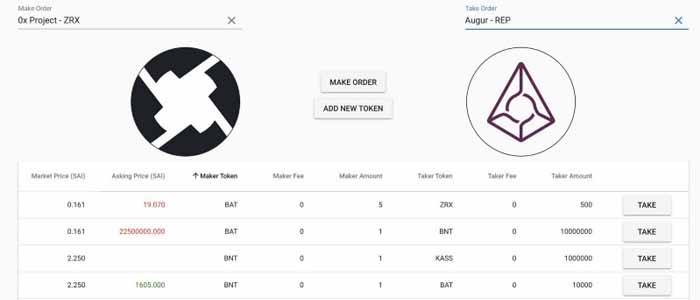
Unsurprisingly, this means that while centralized exchanges are very fast, decentralized ones are slower. Centralized exchanges also tend to have high-performance trading as well as advanced tools and are simple to use.
The 0x Project is closer to a decentralized cryptocurrency exchange than a centralized one but even then, it has notable differences. 0x addresses the main issues with decentralized exchanges: they are expensive, slow, illiquid, and can’t be operated with each other. To operate an order book on the blockchain, each adjustment or new order goes via the blockchain, meaning that everything is held to block times. This also results in network transaction fees at every interaction.
0x addresses both of those issues by developing a standard protocol. This protocol can be applied to all orders relayed off the blockchain. With the protocol, the orders have to go back on the blockchain when they are settled instead of at every transaction. This significantly speeds up the process and eliminates some of the unnecessary transaction fees.
Since 0x will prevent users from having to pay transaction fees by reducing the reliance on the blockchain, there is an opportunity for 0x to charge for use. However, 0x doesn’t charge fees of any type to use their protocol; it is free. Keep in mind, however, that if someone chooses to create a decentralized cryptocurrency exchange using the protocol, that person, known as a Relayer, can charge fees.
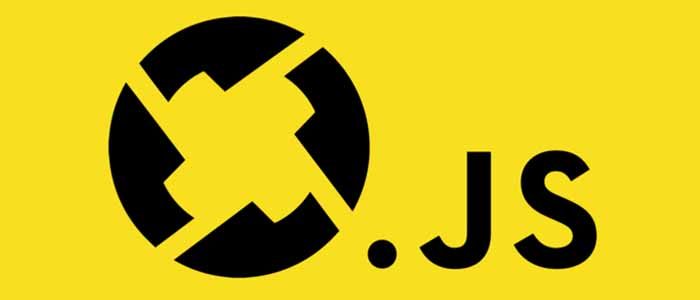
In addition to the 0x protocol, the team also created 0x OTC, a consumer facing product that uses the 0x protocol. The 0x OTC allows peers to exchange Ethereum tokens without requiring a Relayer, provided they connect with the counterparty directly. It is live and simple to use. Send a link to your counterparty to generate and send your order. You can send the order however you want because it is relayed via the blockchain. This way, you can use pencil and paper, email, social media, or any other method of sending the order.
0x ( ZRX ) Tokens
Another aspect of the 0x Project is the unique 0x Ethereum token, known as ZRX. This token is how users pay Relayers’ trading fees. It is also a decentralized form of governance for the 0x protocol’s upgrade system. Essentially, those who own ZRX have input in the protocol and improvements to make that is proportional to the amount owned.
There is a fixed supply of one billion ZRX, and the token launch was recent, on August 15, 2017. 50 percent of the tokens were released during the launch with 15 percent retained by 0x, 15 percent going to the developer fund, 10 percent going to the founding team, and 10 percent going to the advisors and early backers. The tokens allocated for founders and advisors as well as staff members will be released over the course of four years, while those bought during the launch event were liquid immediately.
The 0x seems like a logical step from decentralized cryptocurrency exchanges, effectively taking care of many of the flaws those exchanges contain. Due to its versatility and the easy availability of the protocol, it is not far-fetched that 0x will grow quickly, providing the basis for other similar exchange systems using the Ethereum blockchain.
At the moment ZRX is trading at $0.23 with an all time high of around $0.53 ( as of 5th September 2017 ). There are currently no projects actively launched using the protocol so if you believe in this project, it would seem that now is a good entry point as the price should rise considerably once there are proven uses of it in existence.
Getting Started With 0x
The 0x convention is my best pick to purchase and hold during the current year. It is a convention that takes into account the decentralized trade of ERC-20 tokens-essentially any token that keeps running on the ethereum blockchain. This rundown is broad, and developing. As the rundown develops, the request to purchase/offer/exchange them will likewise develop, and that is the place ZRX comes in.
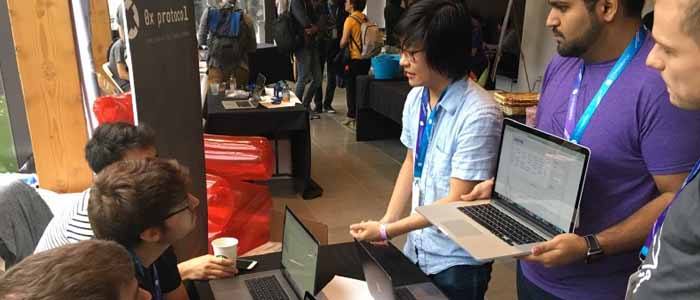
The ZRX convention has a few appealing attributes. Above all else, it is trustless; clients can put arranges straightforwardly from their Ethereum wallets with no compelling reason to send assets to a trade; along these lines there is no counterparty hazard.
Furthermore, it takes into account considerably more noteworthy liquidity since anybody utilizing the convention can get to orders from any other person. So there might be a boundless number of trades based upon the convention, yet every one of them approach the liquidity on the majority of the others. In this manner, ZRX itself does not rely upon any single trade, but rather stands to profit by the total of all trades. Similarly, all trades based on it advantage from access to the whole liquidity pool. The system impact is solid for the two speculators of ZRX, and those making and utilizing trades with it.
Thirdly, the convention is composed such that it can have it both ways. For the most part there are confinements to decentralized trades particularly the speed at which requests can be put and executed. Notwithstanding, with the ZRX convention, the orderbook can be keep running off-chain, with the blockchain being utilized for the settlement part of the exchange. This permits trades utilizing ZRX to have both the speed and feel of a conventional trade, with the trustlessness of a decentralized trade.
Starting at now, there are many unmistakable groups building trades on the convention, including Ethfinex, Radar Relay, and Paradex. It is additionally likely that Augur will join ZRX not far off.
Those are the major/justify based reasons I like ZRX. Notwithstanding, there are likewise some different reasons this token is appealing to me now.
There are gossipy tidbits that ZRX will be added to Coinbase and Gdax at some point this year. While Coinbase's CEO Brian Armstrong as of late tweeted that the trade has no particular intends to include new resources, there are convincing motivations to trust that ZRX will be included. (Counting the way that Brian put forth a comparative expression seven days before Bitcoin Cash was added to Coinbase).

To begin, there are basically a considerable measure of associations between the two elements. Three of ZRX's four counselors are previous coinbase representatives, and every one of them three still have close relationship with coinbase. (Olaf Carlson-Wee, Fred Ehrsam, and Linda Xie). Furthermore, the ZRX group has been to Coinbase central command a few times as of late.
While none of this is solid proof of ZRX being included. . . it just bodes well. Coinbase has said it will include some ERC-20 tokens, and has laid out criteria it uses to pick new resources. ZRX fits those criteria.
Moreover, in addition to the fact that it would bode well for Coinbase to include ZRX, it would bode well for Coinbase to utilize the ZRX convention to trade its present and future ERC-20 tokens.
On one last note, the last reason ZRX is appealing to speculators is absolutely mental the moderately low cost per token. For another crypto financial specialist touching base on the scene with $1,000 to spend, it is to some degree unsuitable for them to purchase 0.1 of a Bitcoin. Regardless of whether sane or not, individuals like the sentiment owning a considerable measure of something. What's more, 500 ZRX feels a ton superior to that 0.1 BTC!
The crux of 0x’s decentralized trading focuses on an off-chain ordering relay that cuts back on gas prices and reduces network bloat. For those of you who have any experience with a decentralized exchange like Ether Delta, you may already see the benefit of off-chain orders.
If you don’t, here’s a quick explanation. Most decentralized exchanges function using smart contracts powered by the Ethereum blockchain. This means that all order functions and trades take place within these smart contracts, and users are always in control of their funds, rather than trusting them to a third party like they would with a centralized exchange (e.g., Binance and Bittrex).
It also means that traders must execute transactions on the blockchain every time they want to manage their funds, whether that be for depositing funds into an exchange’s smart contract or placing, canceling, or filling an order. This costs gas, a fee paid in Ethereum to ensure that these transactions are processed on the blockchain by its miners.
If you were using Ether Delta, for instance, you’d pay a gas fee every time you wanted to deposit funds into the exchange’s smart contract to make an order, and you’d pay another gas fee to execute that trade once your order is filled.
As you can see, between depositing, placing an order, executing a trade, and withdrawing, gas fees can add up quickly. Decentralized exchanges are great for their security benefits, but they lag behind their decentralized counterparts in both user operation costs and accessibility for this very reason.
This is where 0x comes in. The 0x protocol wants to improve decentralized exchanges by utilizing off-chain ordering relays in conjunction with on-chain settlements. Essentially, this allows users to broadcast an order off-chain to be filled by another user. Only value transfers are executed on-chain, leaving all other trading commands to off-chain procedures Thus, transactions are only run through the network when a trade is executed, allowing users to reduce the gas fees associated with trading operations.

To accomplish this, 0x uses what it calls “relayers”. Relayers are responsible for broadcasting orders through public or private order books. They bring liquidity to the network by hosting its order books, acting effectively as an exchange. Unlike an exchange, however, a relayer cannot execute a trade. It can only facilitate trading by presenting maker orders broadcasted to the network.
For a trade to be fully executed, a taker must fulfill the order by submitting the maker’s signature along with its own to the decentralize exchange’s smart contract. In compensation for facilitating this exchange, a relayer is paid a fee in 0x’s native currency, ZRX, for each transaction.
When trades are processed through a relayer, they are known as Broadcast Orders. Broadcast orders allow for anyone to submit an order to the network, and in turn, they also allow for anyone to intercept these orders and fill them.
0x also accommodates Point-to-Point Orders, which are orders transmitted by makers with a specific taker in mind. These orders allow two users to directly transfer funds through a variety of messaging mediums, including email, Facebook messenger, and more. When a maker address sends an order relay this way, only the specified taker address can fulfill it, protecting funds from being hijacked by malicious third parties.
In addition, the 0x protocol is application agnostic, and its smart contracts are open sourced and publically accessible. This allows any development team to build on 0x if they need an exchange function for their token or platform, so the protocol serves as a plug-in for other Ethereum-powered dApps. Its application agnosticism and shared protocol layer also allow for dApp interoperability, creating a “shared infrastructure for a variety of [applications].”
There are already a number of crypto projects that are building on 0x, including Augur, Status, district0x, Blocknet, Request Network, and many more.
Lastly, 0x sports a “Token Registry contract [that] will be used to store a list of ERC20 tokens with associated metadata for each token: name, symbol, contract address, and the number of decimal places needed to represent a token’s smallest unit (needed to determine exchange rates). The registry will serve as an official on-chain reference that may be used by market participants to independently verify token addresses and exchange rates before executing a trade.” 0x stakeholders will be responsible for governing this information by adding, modify, and removing data when needed.
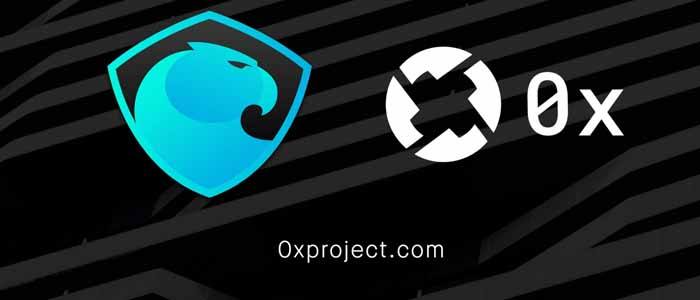
How To Get A 0x Wallet?
Most of 0x’s trading volume comes from Binance or Poloniex in the form of Bitcoin and Ethereum trading pairs, but it’s listed on a number of popular exchanges, including Huobi, OKEx, HitBTC, and Liqui among others.
0x is an ERC20 token, so the Meta Mask browser extension, Ledger Nano S will support 0x along with any other ERC20 compatible wallet. If you’re looking for a software wallet, check out Exodus.
Another unique and perfect 0x aspect is Ethereum token they have, called ZRX, which is used for paying the Relayer’s trading fees. Total supply of ZRX is 1,000,000,000, and a circulating supply is 473,207,599 ZRX! ZRX token is also used for decentralized governance over 0x protocol’s update mechanism which allows it’s underlying smart contracrts to be changed and improved over time.
Token launch was recent, on August 15., 2017, and 50 percent of the tokens were released during the launch, with 15 percent being retained by 0x, followed by developer fund taking 15 percent, 10 percent being adopted by the founding time, and 10 percent by advisors and early backers.
While a lot of people might think that leaving your ZRX tokens in Binance is fine, it is actually not a secure platform and offers hackers with a great opportunity to steal your cryptocurrency.
So, make sure you store your tokens in a dedicated cryptocurrency wallet like MyEtherWallet which is both safe and convenient.
Once you have your ZRX tokens at the Binance exchange, you simply need to send it to your MyEtherWallet’s wallet for which you had earlier saved the private key.

Confirm your transaction via 2FA or email verification and then check your MyEtherWallet for the newly transferred 0x tokens. You will find them under the ‘Token Balances’ where they are safe and protected from the internet hackers.
0x Resources
How To Buy 0x?
Purchasing Ethereum is easy and simple and can be done on a variety of Ethereum exchange platforms. Once you have bought Ethereum, you can exchange it for 0x coins and then store the tokens in your 0x wallet.
Here is a detailed guide on how you can buy Ethereum and then exchange it for 0x:
- Choose an fiat to cryptocurrency Exchange like Coinbase to purchase Ethereum. You can find our complete list of the best cryptocurrency exchanges here.
- Sign up for Coinbase account and verify your bank account or credit/debit cards.
- After verifying your payment option, buy the desired ‘Ethereum’ tokens.
- Confirm your Ethereum purchase.
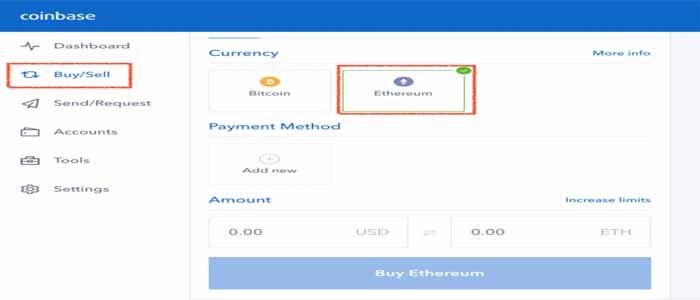
How to exchange Ethereum for 0x on Binance
1. Sign up on Binance for exchanging your Ethereum for 0x tokens.
2. Login to your Binance account by using your email and password.
3. Deposit your Ethereum coins in Binance from your Coinbase account
4. Wait for the coins to appear in your Binance wallet. It might take somewhere around 20 minutes to an hour.
5. Once Ethereum displays in your available balance, you can go ahead with the exchange. For that, go to trade option is Binance and type in 0x to access the ZRX/ETH exchange market.

6. Choose the Market option on ZRX/ETH page to purchase the ZRX coins at the current value.
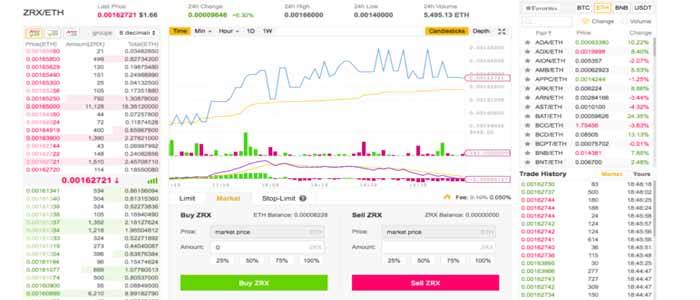
7. Navigate to ‘Funds’ on the top menu and then click on ‘Deposits Withdrawal’. Your ZRX tokens can be seen.
8. You can now transfer these tokens to the MyEtherWallet by using the steps given below.
What Is 0x Mining?
But while 0x will likely make a big splash with its list of well-known investors, it is not the only company aiming for decentralized exchange hegemony.
Already, Ether Delta, iDex, Maker Market (now Oasis Dex) and Shapeshift are building exchanges with similar functionality.
Unlike more traditional economic systems that benefit from competition that drives down price and increases efficiency, the founder of Polychain Capital argues that in the world of decentralized exchanges, there will likely only be one.
Comparing 0x to more centralized exchanges Gemini, Kraken and GDAX, the latter run by his former employer Coinbase, Olaf Carlson-Wee said a single, well-crafted decentralized exchange would move all the liquidity to one place -- making it more attractive to users -- without the risks of centralization suffered by Mt Gox and others.
"The world is the most efficient if everyone is on one order book," said Carlson-Wee, adding:
But as the failed decentralized ethereum investment platform known as the The DAO made clear, just because something is decentralized that doesn't assure it is safe from attack.

To help ensure the resilience of 0x founder Will Warren says the firm will use 100% the money from the investment and a corresponding future token sale to build open source software tools and infrastructure that supports the ecosystem.
Latest 0x News
Front-running, Griefing and the Perils of Virtual Settlement (Part 2)
There are a variety of ways that 0x protocol may be used that eliminate front-running and trade collisions, each with unique trade offs. The solutions presented in part 1 do so at the expense of networked liquidity, a unique property of 0x protocol that is described below. In this post, we will discuss ways 0x protocol may be used that prevent front-running and trade collisions while preserving networked liquidity by setting the 0x order schema’s taker parameter to a smart contract address.

Networked liquidity refers to the seamless flow of orders through a network of interconnected exchanges, marketplaces and dApps. The interconnections act as a source of network effects, the phenomenon where a product or service gains additional utility as more people use it.
Network effects are particularly important in marketplaces. Exchanges exist to aggregate buyers and sellers in one place — creating a pool of liquidity and, by extension, a more functional market. Networked liquidity allows for the same sort of aggregation, while remaining decentralized.
